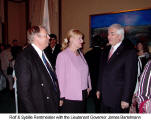
Letter from the Editor

Dear Reader
When I started Echo Germanica in April of 1990 I had no idea that our labour of love would turn out to be such an engaging project; nor did I suspect that I would receive so much attention for something I saw, after much surveying, as a necessity, namely to preserve and spread our German cultural heritage into other ranks and cultures as well as our own.
All along I wanted nothing better than to show what a terrific group of people German Canadians and other people with a German cultural background really are. Especially the arts are most suitable to build missing bridges between generations, countries and cultures. To have this effort acknowledged is fine reward indeed.
Our title photo shows Rachel Seilern at a barn dance with younger children. This is truly symbolic for the idea of creating futures, of preserving a heritage. While it is certainly true that one should be familiar with one’s own past, even Johann Wolfgang von Goethe subscribed to that, it is even more important to create a future. There is no better way to do that than with those who represent the future, our young people and children. They deserve our support and care, and whenever we see them do something wonderful, we should heap praise on them. But we have to let them do it their way to keep them interested in their heritage. We cannot dictate what they should like or dislike, in what language they should do it in, especially not if we want them to share their heritage with friends of other cultural backgrounds.
Truly, the German culture expresses itself most exquisitely in the use of German Language, especially in the literary arts, but that is not the only way.
Some of our readers might recall our award winning article "What is German?" The data in it was researched over many years, and I think it needs to be updated. So, please do not be surprised if one of us is going to ask you: What comes to mind when you think about things German?
The expression of German culture among local people of this heritage takes often a different form then when the source of the undertaking is from overseas, as in the German Festival, still ongoing in Toronto. That does not surprise either, because the purpose is distinctly different.
The German Festival wants to basically attract Canadians of all backgrounds to the bounty of German culture and create good will and interest in it, also among expatriates. It is the duty of official organizations and government bodies to do so. When German Canadians participate in this or their own projects it is not an official duty, but a desire and a pleasure to participate for one’s own recreation and as an ambassador to the culture of one’s homeland. As such we as a group are needed to support such official German cultural politics, and that is what it is, politics. Canadians of German background are put a bit in an odd spot when asked to be politically involved in those activities, like a political forum, that takes place between governing bodies, especially if Canadian money is financing the efforts of the Federal Republic of Germany. Suddenly one sits between two chairs. What if the points of view between here and overseas are very different?
Mostly we do not think about such things when it comes to supporting our heritage in any shape or form. We just pick what we like and enjoy. This is only possible because we live in glorious peace times, which hopefully last forever and when even a political forum is usually just an exchange of ideas, a way to find common ground.
For us living here in Canada it is fortunate indeed that we have so many possible expressions of our cultural heritage. We go to the opera, operetta, and concert to hear German compositions. We go to the theatre to see German plays, we go to the movies and see German movies, we go to restaurants and enjoy German food and drink, we buy a car and it could be a German car, we buy an appliance, and if we want to chose a German product, that is possible. Not every culture is this fortunate. This guarantee was given to us in article 27 of the Canadian Charter of Rights and Freedoms, introduced by Gerry Meinzer, well known to us as the founder of the German Canadian Congress and active in a lot of German/Canadian projects.
Interestingly enough I was just invited to work on a documentary as a voice and an associate director on the German project part of this important document. It defines our rights but also our duties and we all should be familiar with it.
Celebrating our diverse cultures is a right, but also asks us to take responsibility for safeguarding those rights not just for ourselves but also for all Canadians and their heritage, and for the future, making our participation mandatory.
I hope you continue to enjoy our way of celebrating our heritage as much as we do!
Until next time! And in the meantime: Have a great Thanksgiving!
Sybille Forster-Rentmeister
Comments to: editor@echoworld.com


